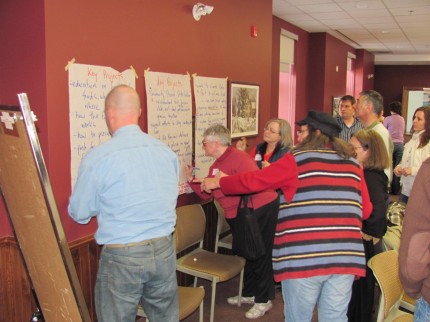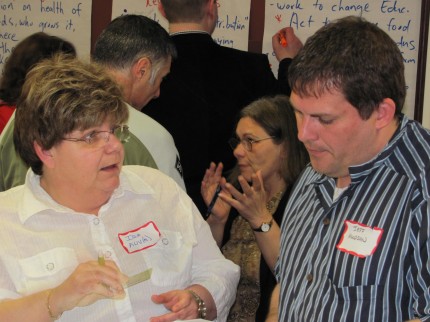Just a Taste: Waterloo’s Summit of Many Parts
Posted: May 20, 2011
Categories: Tasting Notes
Tasting Notes
One of the privileges I have as program coordinator at Sustain Ontario is the chance to visit and learn from communities all over Ontario. As a way to share the amazing stories and ideas that are being sparked throughout the province, I will be writing “Tasting Notes†on our blog. Please feel free to send new ideas or community events that you want showcased our way!
Just a Taste: Waterloo’s Summit of Many Parts
On Saturday, April 30th, I attended the Waterloo Region Food Summit along with 55 other participants. The day was organized by the Waterloo Region Food System Roundtable, and saw committed foodies discuss priorities for improving the health of the food system, updates on progress and important actions for the next year.
The Region of Waterloo has long been acknowledged as a leader in innovative food programs and policies. Waterloo region is the only region that has a regional official plan that designates a countryside line, establishing limits to urban growth and protecting farmland. The region’s Catholic school board has also set a higher bar than the province for healthy food in schools. Compared with Ontario’s School Food and Beverage policy, which restricts the sale of food and beverages sold by schools themselves, the Waterloo Catholic District School Board has restricted the sale of foods by the school as well as snack programs and other groups. Public Health and School Board staff are running “policy peer†programs in schools where kids mentor other kids on enjoying foods that meet the healthy guidelines.
Roundtable members have also made some inspiring progress in the realm of urban agriculture. The region’s community garden council has created a policy proposal that outlines how various municipalities can help better support community gardens. While the proposal deals with some of the challenges community gardeners face (ie Waterloo will assist residents in finding a location for gardens, but does not offer any resources while Kitchener offers $1000 to each garden but doesn’t assist with site locating), there are some great opportunities as well. The Cambridge detachment of the regional police department, for instance, has created a community garden for youth. The council also hosted an accessible garden design charrette, creating plans for actual gardens that can be altered so that seniors and people in wheelchairs can also share in the garden.
The Roundtable has named 6 Food System Priorities: Food Sovereignty, Food Policy, Urban Agriculture, Local Food Infrastructure, Farm Viability and Access to Healthy Food. During the second half of the day, these priorities were discussed and the next steps for each area were narrowed down through a world café. Some great new ideas emerged, and there was a vote around what actions should take priority for the next year including: advocating to the municipal governments for farm viability and accessing healthy food in cities; creating neighbourhood food buying, growing, and preserving clubs; creating a website for local producers to post available foods and prices; advocating to get schools to have more food in the curriculum, school gardens; and advocating for public institutions to buy more local foods.
With so much great work being done in the region, I’m excited to see what the Roundtable does next.
Follow this movement at their amazing new Foodie Finder website at: http://www.wrfoodsystem.ca/blog/2011/05/09/food-summit-makes-the-connections
by Carolyn Young, Project Coordinator at Sustain Ontario


